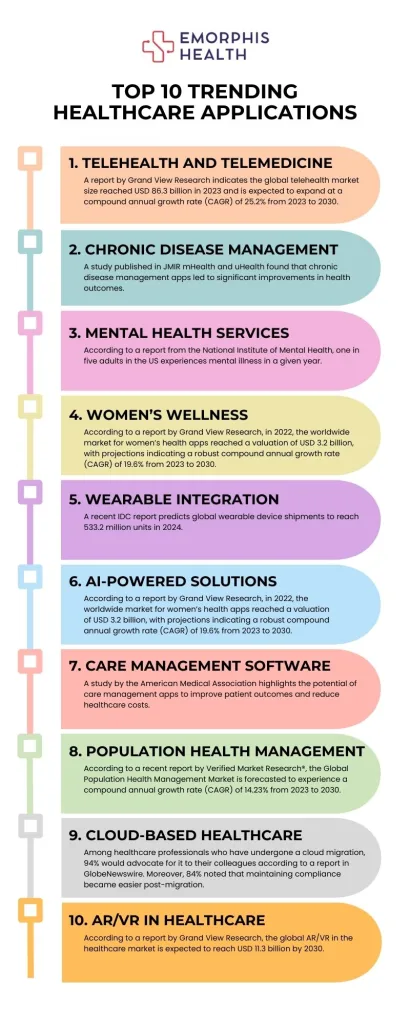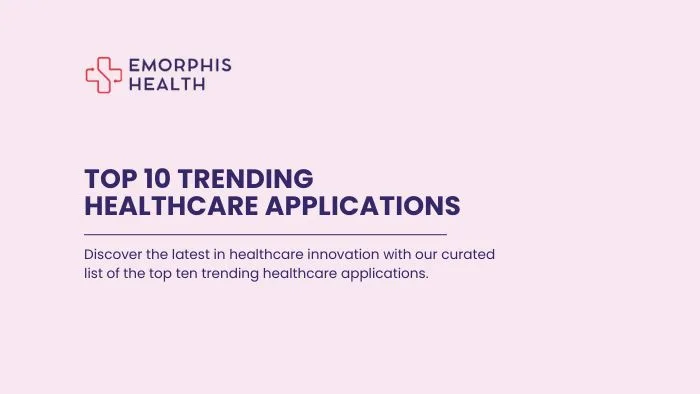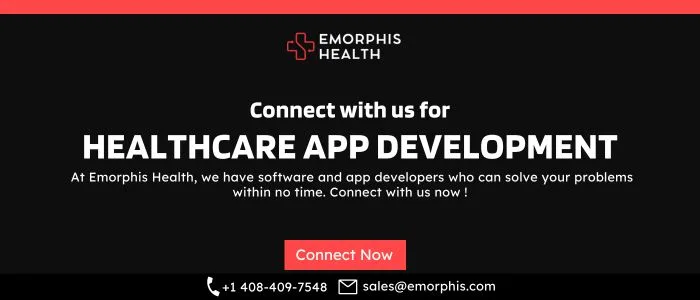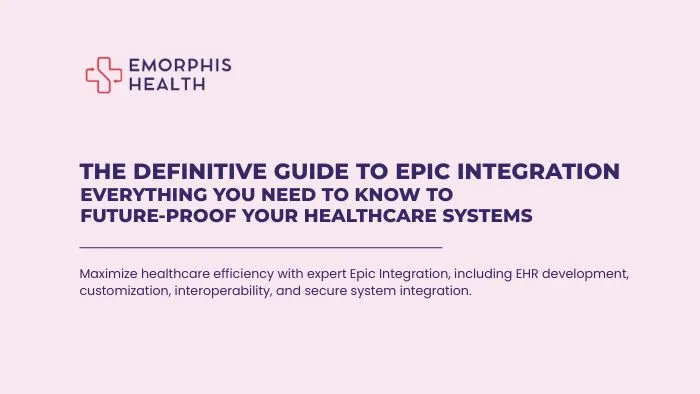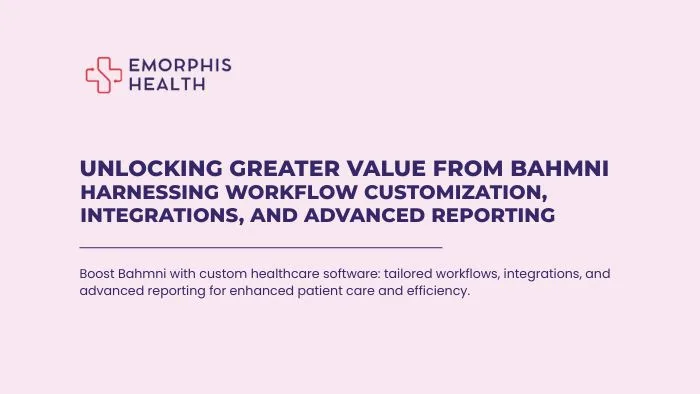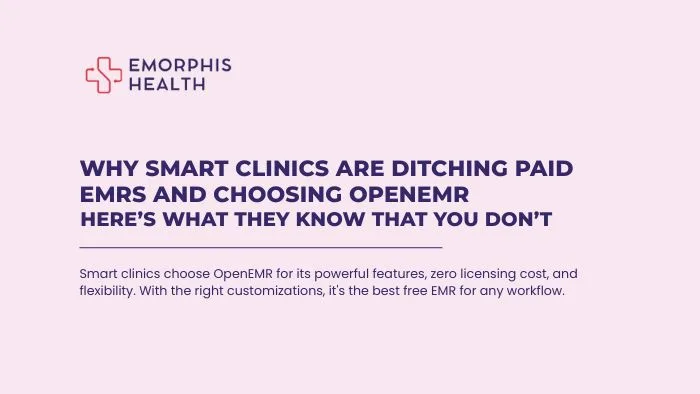Overview
See Contents
- 1 Overview
- 2 1. Telehealth and Telemedicine
- 3 2. Chronic Disease Management
- 4 3. Mental Health Services
- 5 4. Women’s Wellness
- 6 5. Wearable Integration
- 7 6. AI-powered Solutions
- 8 7. Care Management Software and Applications
- 9 8. Population Health Management
- 10 9. Cloud-Based Healthcare
- 11 10. AR/VR in Healthcare
- 12 Conclusion
Healthcare applications are popular for several reasons. Firstly, they improve access to healthcare by allowing patients to receive medical advice, consultation, and monitoring remotely, particularly beneficial for those in remote or underserved areas. Secondly, they enhance convenience by enabling patients to schedule appointments, access medical records, and communicate with healthcare providers from the comfort of their homes.
Additionally, healthcare applications empower patients to take control of their health through features like medication reminders, symptom tracking, and lifestyle management tools. Furthermore, these applications streamline administrative tasks for healthcare providers, reducing paperwork and improving efficiency. Overall, healthcare applications offer a user-friendly and efficient means of accessing healthcare services, contributing to their popularity.
What will you learn from this article?
- Healthcare App Trends: The article explores the rising trend of healthcare applications, highlighting 10 popular types and their benefits.
- Key Features: Each application type’s features and advantages are outlined, including telehealth, chronic disease management, mental health services, and more.
- Development Insights: It offers insights into development timeframes and costs for each application type, aiding in decision-making for implementation.
- Custom Solutions: Emphasizes the importance of custom software development for tailored solutions, citing advantages over generic options in meeting specific healthcare needs.
Here’s a look at 10 trending healthcare application types, focusing on various areas of patient care and healthcare delivery.
1. Telehealth and Telemedicine
The convenience of virtual consultations is undeniable. A report by Grand View Research indicates the global telehealth market size reached USD 86.3 billion in 2023 and is expected to expand at a compound annual growth rate (CAGR) of 25.2% from 2023 to 2030.
Telehealth and telemedicine revolutionize healthcare delivery by enabling remote consultations also, medical services using telecommunications technology. In fact, patients can connect with healthcare professionals through video calls, messaging platforms, or mobile apps. Moreover, it eliminates the need for in-person visits. As a matter of fact, this technology allows for real-time communication. Moreover, information exchange between patients and healthcare providers. It enables diagnosis, treatment planning, and also, follow-up care to be conducted remotely.
Benefits of Telehealth and Telemedicine Healthcare Applications
Telehealth and telemedicine are employed to overcome geographical barriers, particularly in rural or underserved areas where access to healthcare is limited. Telemedicine app development solutions, facilitate timely consultations, follow-ups, and medical advice, improving patient outcomes and satisfaction. Additionally, telehealth reduces healthcare costs by minimizing travel expenses and hospital admissions, making healthcare more accessible and convenient for patients. Moreover, telemedicine enhances healthcare accessibility for individuals with mobility limitations, chronic illnesses, or other constraints that make in-person visits challenging.
Timeframe for Development
Developing a custom telehealth solution typically takes 6 to 12 months, depending on the features and complexity required. Costs for developing a custom telehealth platform can range from $50,000 to $200,000, depending on the features, integrations, and scalability needed.
Why Opt For Custom Software Development For Telehealth and Telemedicine Healthcare Applications?
Custom software development allows for tailored features, seamless integration with existing systems, and compliance with healthcare regulations. Off-the-shelf solutions may lack flexibility and fail to address specific healthcare needs, making custom development the preferred option for optimal patient care and practitioner efficiency.
2. Chronic Disease Management
Healthcare applications that help manage conditions like diabetes or heart disease are invaluable for patients. A study published in JMIR mHealth and uHealth found that chronic disease management apps led to significant improvements in health outcomes.
Chronic disease management involves the use of digital tools and platforms to monitor, track, and manage long-term health conditions such as diabetes, hypertension, and heart disease. These tools often include mobile apps, wearable devices, and web-based platforms that help patients and healthcare providers collaborate in managing chronic illnesses effectively. They enable patients to monitor vital signs, track symptoms, adhere to medication regimens, and make lifestyle modifications to improve their health outcomes.
Benefits of Chronic Disease Management Healthcare Applications
Chronic disease management is essential for promoting patient empowerment and self-management, enhancing quality of life, also, reducing the risk of complications associated with long-term health conditions. Moreover, by providing patients with real-time monitoring and personalized interventions, chronic disease management solutions enable proactive healthcare management, reducing the need for emergency interventions and hospitalizations.
Timeframe for development
Developing a custom chronic disease management system typically takes 8 to 14 months, it also depends on the features and integrations required. Costs for custom development may range from $80,000 to $300,000, depending on the complexity and scalability of the solution.
Why Opt For Custom Software Development for Chronic Disease Management?
Custom solutions offer personalized care plans, integration with various devices, and also, better patient engagement. Off-the-shelf solutions may lack flexibility and fail to integrate seamlessly with existing healthcare systems, moreover, making custom development essential for effective chronic disease management.
3. Mental Health Services
With growing awareness of mental health issues, apps offering therapy, meditation, and stress management techniques are gaining traction. According to a report from the National Institute of Mental Health, one in five adults in the US experiences mental illness in a given year.
Mental health services leverage technology to provide accessible and personalized mental healthcare solutions. These services encompass a wide range of interventions, including therapy sessions, mental health assessments, mood tracking, and self-help resources delivered through digital platforms such as mobile apps, online therapy platforms, and virtual support groups. They aim to address various mental health conditions, including depression, anxiety, PTSD, and bipolar disorder, by offering evidence-based interventions and support.
Benefits of Mental Health Services Healthcare Applications
Mental health services address the growing demand for mental health support and resources, particularly in light of increasing mental health awareness and the prevalence of mental health conditions. These services offer individuals convenient access to mental health professionals, reduce the stigma associated with seeking help, and provide ongoing support for managing mental health conditions effectively. By leveraging technology, mental health services strive to make mental healthcare more accessible, affordable, and destigmatized.
Timeframe for Development and Cost
Custom development for mental health platforms typically spans 9 to 15 months, depending on the features, integrations, and scalability required. Costs for custom development may range from $100,000 to $400,000, depending on the complexity and customization needed.
Why Opt For Custom Software Development For Mental Health Services
Custom solutions offer tailored interventions, comprehensive data analytics, and secure communication channels, fostering improved patient outcomes and treatment adherence. Off-the-shelf options may lack customization and fail to address specific patient needs, making custom development the preferred choice for delivering effective mental health services.
Click the link to check Healthcare App Development Services
4. Women’s Wellness
Apps addressing female health needs, from menstrual cycle tracking to pregnancy support, are a growing trend. According to a report by Grand View Research, in 2022, the worldwide market for women’s health apps reached a valuation of USD 3.2 billion, with projections indicating a robust compound annual growth rate (CAGR) of 19.6% from 2023 to 2030.
Women’s wellness applications cater to the unique healthcare needs of women, offering personalized solutions for reproductive health, pregnancy, and overall well-being. These applications encompass various features such as menstrual cycle tracking, fertility planning, pregnancy monitoring, breastfeeding support, and menopause management. They aim to empower women to take control of their health and make informed decisions about their reproductive and general wellness.
Benefits of Women’s Wellness Healthcare Applications
Women’s wellness applications address the specific healthcare needs of women at different stages of their lives, promoting reproductive health, supporting pregnancy and childbirth, and facilitating postpartum care. They provide valuable information, resources, and tools to help women track their menstrual cycles, monitor fertility, plan pregnancies, and manage symptoms associated with menopause. By offering personalized support and guidance, these applications contribute to improved health outcomes and enhanced quality of life for women.
Timeframe for development
Developing a custom women’s wellness application typically takes 6 to 12 months, depending on the features, integrations, and scalability required. Costs for custom development may range from $50,000 to $200,000, depending on the complexity and customization needed.
Why Opt For Custom Software Development For Women’s Wellness?
Custom solutions enable tailored features and functionalities that cater specifically to women’s healthcare needs, such as menstrual cycle tracking, fertility planning, and pregnancy monitoring. Off-the-shelf solutions may offer generic features but lack the specificity and customization required to address individual wellness needs, making custom development the ideal choice for delivering comprehensive women’s healthcare solutions.
5. Wearable Integration
Fitness trackers and other wearables generate valuable health data. Apps that connect with wearables allow users to monitor vitals, sleep patterns, and activity levels. A recent IDC report predicts global wearable device shipments to reach 533.2 million units in 2024.
Wearable integration involves integrating wearable devices with healthcare systems to collect and analyze patient data, facilitating remote monitoring and personalized healthcare delivery. Wearable devices include smartwatches, fitness trackers, and medical-grade sensors that can track various health metrics such as heart rate, activity levels, sleep patterns, and blood glucose levels.
Benefits of Wearable Integration and Healthcare Applications
Wearable integration offers several benefits in healthcare, including continuous monitoring of patient’s health metrics, early detection of health issues or abnormalities, and personalized treatment planning based on individual health data. By providing real-time insights into patients’ health status, wearable integration enables healthcare providers to deliver proactive and timely interventions, improve patient outcomes, and enhance the overall quality of care.
Timeframe for Development and Cost
Developing a custom wearable integration solution typically takes 6 to 12 months, depending on the complexity of the integration, also the number of wearable devices to be integrated. Moreover, the costs for custom development may range from $50,000 to $200,000, depending on the scope and scale of the integration project.
Why Opt For Custom Software Development For Wearable Integration?
Custom development allows for seamless integration with various wearable devices, ensuring compatibility, also, data accuracy, and security. Off-the-shelf solutions may offer limited compatibility and functionality, moreover, making custom development the preferred choice for healthcare organizations seeking to leverage wearable technology effectively to improve patient care and outcomes.
6. AI-powered Solutions
Artificial intelligence is transforming healthcare. AI-powered apps can analyze medical data, identify trends, and even offer personalized health recommendations. A report by Accenture highlights that 80% of healthcare executives believe AI will significantly impact their organizations in the next three years.
AI-powered solutions in healthcare utilize artificial intelligence algorithms and machine learning techniques. In fact, this helps to analyze vast amounts of medical data and improve diagnostics, treatment planning, and patient care. These solutions encompass various applications, including medical imaging analysis, predictive analytics, also, personalized treatment recommendations, and virtual health assistants.
Benefits of AI-powered Solutions
AI-powered solutions offer several advantages in healthcare, including enhanced accuracy and efficiency in diagnosing diseases, identifying treatment options, and predicting patient outcomes. Moreover, by analyzing large datasets and identifying patterns or correlations that may not be apparent to human healthcare providers, AI can assist in the early detection of diseases, optimization of treatment plans, and improvement of patient care delivery processes.
Timeframe for Development and Cost
Developing a custom AI-powered healthcare solution typically takes 9 to 18 months, depending on the complexity of the algorithms, data integration requirements, and also, regulatory considerations. Further, costs for custom development may range from $100,000 to $500,000, depending on the scope and scale of the AI project, including data acquisition, algorithm development, and integration with existing healthcare systems.
Why Opt For Custom Software Development to Build AI-Powered Solutions?
Custom development allows for the creation of AI models tailored to specific healthcare applications and datasets, ensuring optimal performance and accuracy. Off-the-shelf AI solutions may lack customization and may not be suitable for addressing the unique challenges and requirements of individual healthcare organizations, making custom development the preferred choice for organizations seeking to leverage AI technology effectively to improve patient care and outcomes.
7. Care Management Software and Applications
Care Management Software and apps connect patients, caregivers, and healthcare providers, facilitating communication, medication adherence, and appointment scheduling. A study by the American Medical Association highlights the potential of care management apps to improve patient outcomes and reduce healthcare costs.
Care management software and apps streamline care coordination and communication among healthcare providers, patients, and caregivers. These platforms typically include features such as care plans, appointment scheduling, medication management, secure messaging, and care team collaboration tools. They aim to improve care quality, reduce medical errors, and enhance patient satisfaction by ensuring that all members of the care team are informed and coordinated in delivering patient care.
Benefits of Care Management Software and Applications
Care management software and apps are used to address the complexities of modern healthcare delivery, particularly for patients with chronic or complex medical conditions who require coordinated care across multiple providers and settings. By centralizing patient information, facilitating communication among care team members, and enabling proactive monitoring and management of patient needs, care management platforms help ensure that patients receive timely, comprehensive, and personalized care.
Timeframe for Development and Cost
Developing a custom care management platform typically takes 8 to 14 months, depending on the features, integrations, and scalability required. Costs for custom development may range from $80,000 to $300,000, depending on the complexity and customization needed.
Why Opt For Custom Software Development for Care Management Software and Applications?
Custom development allows for tailored workflows, interoperability with electronic health records (EHRs), and integration with existing healthcare systems, ensuring that the care management platform meets needed requirements Off-the-shelf solutions may offer generic features but lack the customization and interoperability required for effective care coordination across diverse healthcare settings, making custom development the preferred choice for optimizing care delivery.
8. Population Health Management
Population Health Management apps focus on improving the health of entire communities by identifying at-risk populations and promoting preventive care. According to a recent report by Verified Market Research®, the Global Population Health Management Market is forecasted to experience a compound annual growth rate (CAGR) of 14.23% from 2023 to 2030.
Population health management involves analyzing and managing health outcomes within specific populations to improve overall health and well-being. It includes identifying health disparities, implementing interventions to address risk factors and social determinants of health, and measuring the impact of these interventions on population health outcomes.
Benefits of Population Health Management Applications
Population health management is used to address the healthcare needs of diverse populations, improve health outcomes, and reduce healthcare costs by focusing on preventive care and addressing underlying determinants of health. By analyzing population health data, identifying high-risk individuals or communities, and implementing targeted interventions, population health management programs aim to improve health equity, reduce disparities, and enhance the overall health and well-being of communities.
Timeframe for Development and Cost
Developing a custom population health management solution typically takes 9 to 18 months, depending on the complexity of the data analytics capabilities, scalability requirements, and integration with existing healthcare systems. Costs for custom development may range from $100,000 to $500,000, depending on the scope and scale of the population health management program, including data acquisition, analytics infrastructure, and intervention implementation.
Why Opt For Custom Software Development for Population Health Management Applications?
Custom development allows for comprehensive data aggregation, predictive analytics, and targeted interventions tailored to the specific needs and characteristics of the population being served. Off-the-shelf solutions may offer basic population health management tools but lack the customization and scalability needed to address diverse population health challenges effectively, making custom development the preferred choice for achieving meaningful population health outcomes.
9. Cloud-Based Healthcare
Cloud computing offers a secure and scalable platform for storing and accessing healthcare data. Among healthcare professionals who have undergone a cloud migration, 94% would advocate for it to their colleagues according to a report in GlobeNewswire. Moreover, 84% noted that maintaining compliance became easier post-migration.
Cloud-based healthcare solutions leverage cloud computing technology to store, manage, and analyze healthcare data securely and efficiently. These solutions encompass various applications, including electronic health records (EHRs), medical imaging storage, telemedicine platforms, and data analytics tools, all hosted on cloud infrastructure.
Benefits of Cloud-Based Healthcare Applications
Cloud-based healthcare solutions offer several benefits, including improved accessibility, scalability, and cost-effectiveness compared to traditional on-premises infrastructure. With cloud computing in healthcare, centralizing healthcare data in the cloud, healthcare organizations can access patient information from anywhere, at any time, facilitating seamless care coordination and collaboration among providers. Cloud-based solutions also enable healthcare organizations to scale their IT infrastructure more flexibly to accommodate growing data volumes and user demands, without the need for significant upfront investment in hardware and infrastructure.
Timeframe for Development and Cost
Developing a custom cloud-based healthcare solution typically takes 6 to 12 months, in fact, it also depends on the scope of the project, data migration requirements, and integration with existing systems. Furthermore, in regards to costs for custom development, it may range from $50,000 to $200,000, depending on the complexity of the solution, data security requirements, and scalability needs.
Why Opt For Custom Software Development for Cloud-Based Healthcare Applications?
Custom development allows for tailored cloud infrastructures optimized for healthcare data storage, security, and also compliance requirements. Moreover, off-the-shelf cloud solutions may lack the customization and flexibility needed to address specific healthcare workflows and data security concerns, making custom development essential for leveraging the full potential of cloud technology in healthcare.
10. AR/VR in Healthcare
Augmented reality (AR) and virtual reality (VR) have exciting applications in healthcare. AR can assist surgeons during procedures, while VR can be used for phobia treatment or patient education. According to a report by Grand View Research, the global AR/VR in the healthcare market is expected to reach USD 11.3 billion by 2030.
Augmented Reality (AR) and Virtual Reality (VR) in healthcare involve the use of immersive technologies to enhance medical training, patient education, surgical planning, and rehabilitation. AR superimposes digital information onto the real world, whereas VR generates an entirely immersive virtual environment. These technologies are used in various healthcare applications, including medical education simulations, virtual patient consultations, surgical training, pain management, and therapy sessions.
Benefits of AR/VR in Healthcare Apps
AR and VR in healthcare offer several advantages, including improved training outcomes for healthcare professionals, enhanced patient understanding of medical procedures, and reduced anxiety and pain during medical interventions. By providing realistic simulations and interactive experiences, AR and VR technologies enable more effective learning, better patient engagement, and improved clinical outcomes. These technologies also have the potential to reduce healthcare costs by optimizing training processes, minimizing errors, and improving patient outcomes.
Timeframe for Development and Cost
Developing custom AR/VR healthcare applications typically takes 9 to 18 months, depending on the complexity of the simulations, user interfaces, and integration with existing systems. Costs for custom development may range from $100,000 to $500,000, depending on the scope and scale of the AR/VR application, including content creation, software development, and hardware requirements.
Why Opt For Custom Software Development for AR/VR in Healthcare Apps?
Custom development allows for the creation of tailored AR/VR experiences optimized for specific healthcare applications and user requirements. Off-the-shelf AR/VR solutions may offer generic experiences but lack the customization and integration needed for various healthcare specialties, making custom development essential for delivering immersive and impactful healthcare experiences.
Conclusion
In conclusion, the diverse range of healthcare applications discussed – from telehealth and chronic disease management to wearable integration and AR/VR in healthcare – underscore the critical role of technology in transforming healthcare delivery. Custom software development offers tailored solutions to address specific healthcare needs, ensuring seamless integration, compliance with regulations, and optimal patient outcomes. While off-the-shelf solutions may offer generic features, they often lack the customization and flexibility required to meet the unique challenges and requirements of healthcare organizations. By opting for custom software development, healthcare providers can leverage technology effectively to enhance patient care, improve operational efficiency, and drive innovation in healthcare delivery.
Emorphis Health is a leading provider of custom software solutions tailored to meet the unique needs of the healthcare industry. Moreover, with a proven track record of delivering innovative and user-centric applications, Emorphis Health is dedicated to helping healthcare organizations leverage technology to improve patient care, streamline operations, and drive better outcomes.
Our team of experienced developers, designers, also healthcare experts collaborates closely with clients to understand their specific requirements and also, deliver tailored solutions that address their unique challenges. Furthermore, if you’re looking to develop a healthcare application that enhances patient engagement, optimizes workflows, or improves clinical decision-making, Emorphis Health is here to help. Contact us today to discuss your project requirements and also to take the first step toward transforming healthcare delivery.
